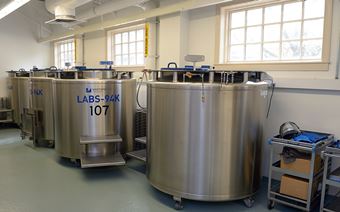 Learning that you or a loved one has a rare genetic disease can be scary. Doctors often are not very well versed in these types of disorders and may require expert knowledge of human genetics.
Learning that you or a loved one has a rare genetic disease can be scary. Doctors often are not very well versed in these types of disorders and may require expert knowledge of human genetics.
However, research scientists are learning more about these diseases every day as technology evolves and more people get involved. Many who face a new rare disease diagnosis find themselves interested in learning how they can help and how they can contribute to the cause in finding new treatments or even cures for these diseases.
One way to get involved is to donate a biological sample to a public biobank such as the National Institute of General Medical Sciences (NIGMS) Repository at the Coriell Institute. We work with scientists to make sure they have the material – cells and DNA – they need to conduct their research. The fact is that without biological samples, this type of research would be impossible, so the scientific value of your participation cannot be overstated. When patients donate to the NIGMS Repository, they are opening the possibility that the next scientific breakthrough might be made using their very own cell lines or DNA.
To better explain the donation process, we answered some questions we are regularly asked:
What is the Coriell Institute’s role in the rare disease community?
We are a centralized source of high quality biomaterials made available to the global research community. That means that from our New Jersey facility, we ship cell lines and DNA to scientists around the world who are interested in using these materials in their research. A large part of our collection is the National Institute for General Medical Sciences Human Genetic Cell Repository, a diverse collection representing mainly heritable diseases and chromosomal abnormalities, that has been hosted at Coriell since the early 1970s. These valuable samples were collected over many years, as we built relationships with the members of the rare disease community and have earned their trust.
How does the sample donation process work?
If you have a rare, heritable disease or chromosomal abnormality, we encourage you to donate to our repository. We accept donations from family members of an individual affected by these types of diseases, as long as the affected person is also submitting a sample.
First, contact us at NIGMS@coriell.org to let us know you are interested. We can walk you through the process and send out a sample collection kit. The kit has everything you need to safely store and send your sample back to us, including the blood or skin tissue tubes, a pre-paid shipping label, and all the required paperwork.
Second, you’ll need to have your sample collected. We accept either blood draws or skin tissue punches which can be taken at your next doctor’s appointment.
Once the sample has been taken, follow the instructions to package it up and send it back to us.
We also encourage our donors to send us as much clinical information as they are willing to share. The most common documents we receive are physician summary letters and genetic testing results. The more details we have for each sample, the more helpful they are to future researchers.
What about my personal information?
All samples are de-identified once they enter our facility, and all personal identifying information is removed from your sample. Privacy is of the utmost importance to us and we take many precautions to ensure that your identity is safe and secure. We have also obtained a Certificate of Confidentiality from the National Institutes of Health to ensure the privacy of our donors.
The NIGMS Repository will not give out your name or any other identifiable information to the scientists who receive these samples. Some personal health information, such as age at the time of collection, gender, diagnosis, race, and ethnicity or country of origin will be made available to scientists.
I’m involved in an advocacy group. Can you work with big groups too?
Absolutely – we regularly collaborate with rare patient advocacy groups by curating promotional materials, participating in patient conferences, and even setting up blood collections. To learn more about the ways that we can work together, email NIGMS@coriell.org.
This material was published by Patient Worthy and can be found at www.patientworthy.com.